
Farmers across the U.S. are joining advocates in calling for immigration reform to address labor shortages and lower food prices as high production costs continue to affect the agriculture industry.
The farm operators said that the Farm Workforce Modernization Act, passed by the House and has yet to pass in the Senate, will provide them with a stable, reliable workforce by creating a path to citizenship for undocumented agricultural workers. The Act would also reform the seasonal farmworker visa program, amongst other changes.
The current labor shortage is not new but has been exacerbated by the pandemic and resulted in higher prices or scarce products for consumers. According to the U.S. Bureau of Labor Statistics, food costs are now 10% higher than last year.
“At a time when labor shortages are contributing to inflation and high food prices, it’s clear that we need the Senate to pass our Farm Workforce Modernization Act to stabilize the agricultural workforce and protect America’s food supply,” Representative Zoe Lofgren, a California Democrat who sponsored the House bill, expressed.
Some worker groups, however, oppose the Act, saying it does not include all immigrants and would aggravate the power imbalances between farm owners and migrant workers.
The Senate version of the legislation, sponsored by Senator Mike Crapo, an Idaho Republican, and Senator Michael Bennet, a Colorado Democrat, would modify and further open up the widely used H-2A temporary work visa program to provide undocumented farmworkers with year-round residency and an eventual path to citizenship.
It is uncertain when the legislation will be presented for a vote in the Senate. Still, as labor shortages contribute to difficulties in food production, the bill has received significant support from hundreds of farmers and agricultural groups. Under the legislation, half of the visas would be allocated to the dairy and livestock industry.
“Since COVID in 2020, I think that the fragility of our food supply chain came to light in that our food supply chain was a little more fragile than most people, myself included, would have thought,” said Charles Wingard. He runs a family farm in South Carolina that produces leafy greens.

Recent Comments